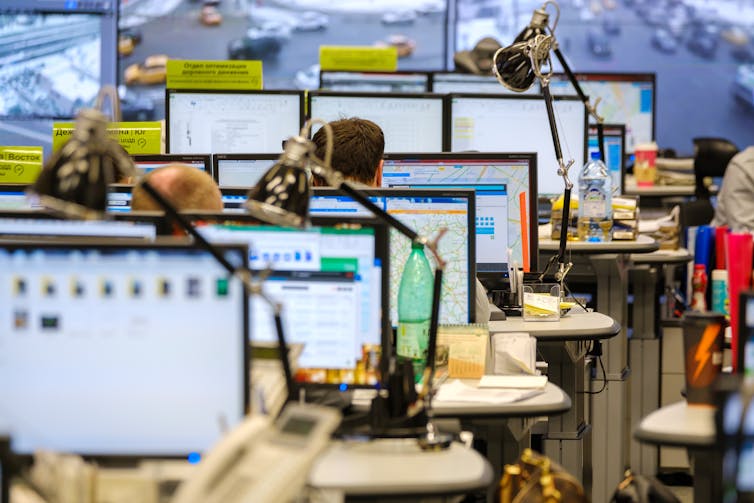Source: The Conversation (Au and NZ) – By Oluremi (Remi) Ayoko, Associate Professor of Mangement, The University of Queensland

Shutterstock
From colleagues chatting about their weekends or having intense phone conversations, to email alerts and loud tapping on keyboards, the evidence that open-plan offices take a toll on our wellbeing continues to mount. There’s a clear relationship between noise levels and physiological signs of stress such as heart rate.
This stress can also manifest in unconscious actions to reclaim control – and while some of these behaviours are therapeutic and benign, others are more toxic.
Our research
shows that office noise increases the likelihood of people wanting to reclaim personal space through territorial behaviours. This might include creating a psychological and physical “border” around their workspace using potted plants, or seeking to mark space as theirs with photos and other personal items.
This means the amount of desk clutter in your open-plan office may be a sign of noise-induced stress.
More noise is also associated with negative feelings such as frustration and anger, as well as antisocial behaviours such as social withdrawal and (to a lesser extent) disagreement with colleagues.
Measuring noise effects
Our study involved 71 participants, working in offices with varying levels of privacy in four different areas of a university.
Over ten working days, every participant kept a diary, recording their perception of noise levels and how they felt twice a day (mid-morning and mid-afternoon).
This type of research is known as a diary study. It is used by researchers in psychology, organisational behaviour and marketing to study and understand long-term changes in attitudes and behaviour.
To measure the perception of office noise, we asked participants to respond, using a seven-point scale (1 = “strongly disagree” to 7 = “strongly agree”) to statements such as “I am disrupted by telephone noises” and “I am disrupted by office machines”.

Shutterstock
To measure their mood and behaviour, participants then rated (also on a seven-point scale) statements such as:
- what is happening around me at the moment is a frustrating experience
- I feel angry about what is happening around me
- I feel like withdrawing from my coworkers
- I want to be left alone in my workplace
- I am experiencing disagreements of ideas with a coworker
- I create a border around my workspace
- I decorate my space the way I want.
Read more:
Open-plan office noise increases stress and worsens mood: we’ve measured the effects
Marking territory
We then used statistical techniques to gauge the strength of the link between noise, negative feelings and the behaviours mentioned above.
We found a moderately strong statistical link between office noise and feelings of frustration, anger and anxiety. We also found people in noisy offices are more likely to withdraw psychologically from their work, perhaps by taking longer breaks than permitted, spending work time on personal matters, or surfing the internet.
We also found a weaker link between office noise and conflict or disagreement between colleagues, on either work-related or non-work issues.
The link between office noise and territorial behaviours was more nuanced, because whereas feelings of anger or annoyance might be fleeting, it takes time and planning to add a pot plant or framed photo to your desk to stake out your territory.
In other words, your colleague talking loudly on the phone about football might annoy you, but it won’t cause you to immediately decorate your office cubicle with more photos of your pet cat.
However, we found that for every one-point increase (on the seven-point scale) in anger, frustration or anxiety suffered by our survey participants, the likelihood of them going on to display territorial behaviours at their workspace increased more than threefold.
To put it simply, we found that noisier workplaces are more likely to put workers in a bad mood, and over time these negative emotions are associated with increased territoriality.
Perhaps unsurprisingly, we also found these effects are strongest in low-privacy spaces such as open-plan offices, and less noticeable in smaller and more private settings such as a single-person office.
A psychological coping mechanism
People personalise their work spaces by adding photos (a form of territoriality) not only to claim their workspace or because they are just nice, but they deliberately decorate or modify their work spaces with these photos to reflect their identities. The opportunity to reflect their identities (that is, bringing their “whole self” to work) is thought to increase workers’ satisfaction and wellbeing and, ultimately, organisational wellbeing.
Personalisation is more important for women than men, and they personalise their space with different items. Women are more likely to display items such as photos and letters from friends and family, while men tend to personalise with things to do with sports and entertainment.

Shutterstock
We are emotional creatures with a need for distinctiveness, self-identity, control and belonging. This doesn’t disappear when we go to work. A sense of psychological ownership over one’s workplace and work is associated with increased job satisfaction and organisational commitment.
This helps to explain why in a “hot-desk” office, most people tend to return to the same workspace daily.
Workplaces with hard rules against personal items in open-plan offices, or hot-desking offices where workers are required to leave the space clear at the end of the day, may well be negating a simple way for their workers to cope. In the process, they may even be harming their organisational wellbeing and productivity.
Read more:
Working from home immoral? A lesson in ethics, and history, for Elon Musk
The other cheap and obvious way to reduce office noise is through hybrid working, reducing the number of people in the office at a given time.
Employers pushing to have workers return to the office should balance the perceived productivity gains against the evidence that noisy offices means employees might be grumpier, more frustrated, and more likely to put up walls – both literal and metaphorical.
![]()
Oluremi (Remi) Ayoko receives funding from Australian Research Council.
– ref. This desk is mine! How noisy offices can make us more territorial – https://theconversation.com/this-desk-is-mine-how-noisy-offices-can-make-us-more-territorial-210451




